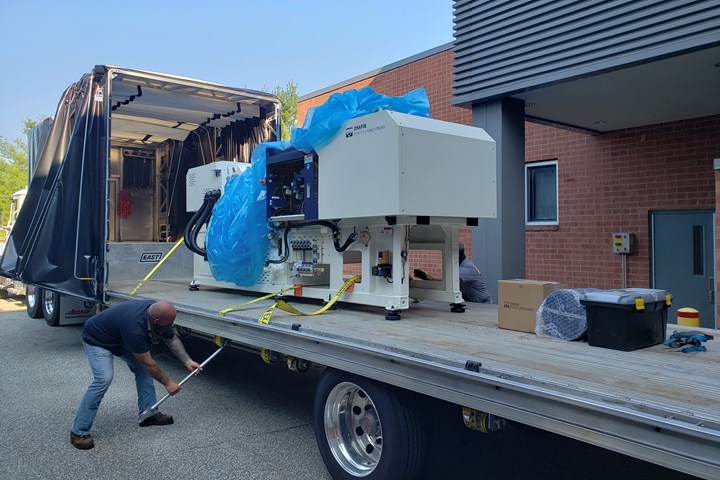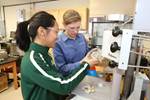Penn State Behrend (Erie, Penn.) has created a new Polymer Engineering and Science program and degree where students will learn to analyze polymers and evaluate their potential application in a variety of industries, including health care, aerospace and automotive.
Penn State Behrend is already well established as a center of advanced learning for plastics. The college’s degree in plastics engineering technology is one of only four accredited programs in the U.S., and the school reports that its plastics processing lab in Burke Center is the largest academic plastics lab in the country.
Greg Dillon, professor of polymer engineering and science and chair of the program noted growing demand for the new major’s area of expertise. “Because of their deep understanding of the relationships between structure, processing and properties, polymer scientists and engineers are in demand in every industry that uses polymers,” Dillon said, “and that’s almost every imaginable industry.”
Students pursuing this degree will have course work in the plastics and other labs, while also studying physics, chemistry and math. The school stressed that knowledge of the structure, processing and properties of polymers will be used in part to explore sustainability and the circular economy. The new degree will require 130 credits—here’s a breakdown of the required courses.
A spokesperson told Plastics Technology that the lab work will include some time studying the fundamentals of plastics processing—injection molding, extrusion and blow molding all covered—as will the essential physics and rheology of polymer processing. Those topics are studied in greater depth in the PLET major, however, the spokesperson said. The new major will place more emphasis on synthesis, properties and characterization, so material design, rather than process or product design.
Like other students in Penn State Behrend’s engineering programs, students in the new program will complete a senior design project, working with project sponsors under the direction of engineering faculty members. With this newest major, Behrend’s School of Engineering now offers 11 bachelor’s degrees; two associate degrees; a number of minors, including the newest program in biomedical engineering; and a master of manufacturing management degree. Its bachelor’s and associate degree programs are accredited by the Accreditation Board for Engineering and Technology (ABET).
A spokesperson told Plastics Technology that there are currently 100 students enrolled in the schools Plastics Engineering Technology program, with that figure holding steady over recent years.
“One of the strengths of the PES program is the existing 10,000-ft2 Plastics Engineering Technology Lab at Behrend,” Tim Kurzweg, director of Penn State Behrend’s School of Engineering said. “The college operates one of the few academic labs that will have material characterization equipment located adjacent to the processing equipment, allowing faculty and students to do a full life-cycle analysis of a material, from creation, application processing, and end-of-life material study.”

Penn State Behrend took delivery of a 100-ton Zhafir Zeres injection molding machine on consignment from Absolute Haitian earlier in 2020.
Related Content
-
The Cost of High Employee Turnover in Injection Molding: Why Retention Matters
Starting in molding in 1993 and clocking in for nearly every job on the floor over the intervening decades, I’ve seen all sides of the hiring, training and retention process in the industry. Here are my thoughts on how to keep your most important asset — your people.
-
Shawnee State University’s Plastics Engineering Program Earns Accreditation
The Accreditation Board for Engineering & Technology certification makes the university’s program one of just four bachelor’s programs in the world with this designation and the only program of its kind in the state of Ohio.
-
American Injection Molding Institute Opens Mold Maintenance Classroom
The Beaumont subsidiary has opened the Mold Maintenance Center of Excellence classroom at its Erie, Pennsylvania, headquarters.
















